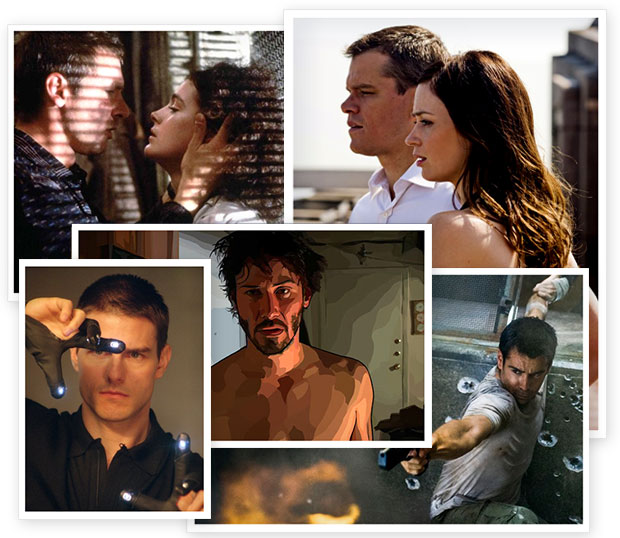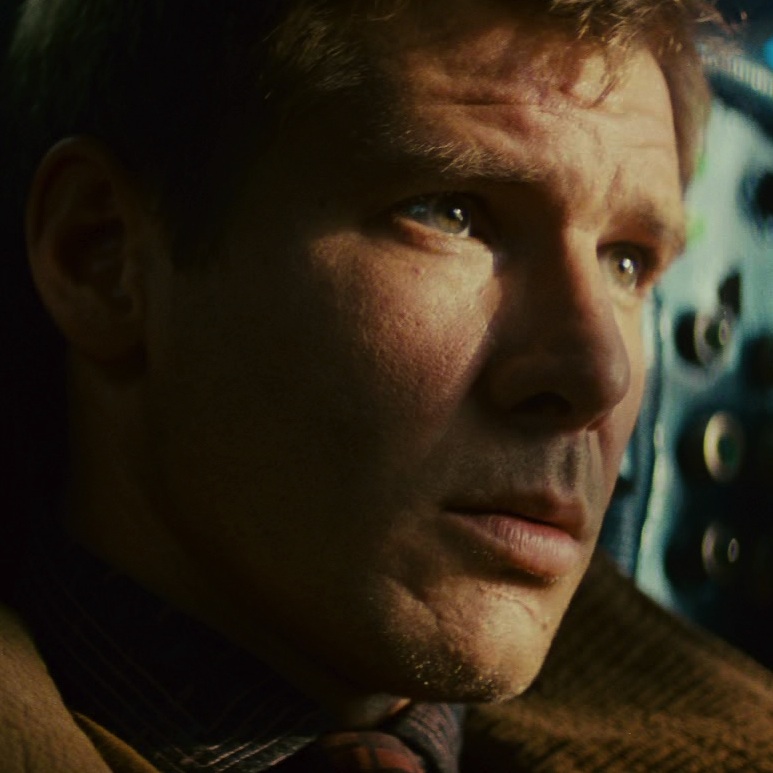
You may not instantly recognize the name Philip K. Dick, but you’ve seen films based on his extensive catalog of short stories and novels. The American writer’s texts are behind such movies as Blade Runner, A Scanner Darkly, The Adjustment Bureau, Minority Report, and this weekend’s potential blockbuster, Total Recall. However, there’s a distinct theme that joins these sci-fi flicks: almost all of them differ greatly from the texts from whence they came. Looking at Dick’s work, it’s easy to see how his dystopian explorations of sociological and political themes would merit significant changes on the big screen. Is it possible to faithfully adapt a Dickian text for the big screen? And if so, how would we know it when we see it?
The answer is murky. The main problem lies with the source material itself. While Dick wrote culturally significant novels like Do Androids Dream of Electric Sheep? (the inspiration for Blade Runner) and A Scanner Darkly, the majority of his work is in the world of short fiction. He yielded over 120 short stories in his career, and many of those stories serve as food for Hollywood productions, including Total Recall which is adapted from “We’ll Remember It For You Wholesale.” The issue is, with only 10 or so pages of story to go on, any feature film is going to need another writer to flesh out the remainder of the narrative — a structure in which Dick’s story’s thoughtful questions can be placed. In the case of most Dick adaptations, including The Adjustment Bureau and Minority Report, screenwriters were tasked with building the world around an idea or scenario, and often times, all that remains of the Dick text by the time the project is realized is the initial peg for the story.
“I just don’t think his work is particularly well-suited for adaptation,” Philip K. Dick scholar, founder of the Total Dickhead blog, and professor at San Francisco State University, David Gill, tells Hollywood.com. Gill notes that he’s somewhat of an odd man out among Dick scholars when it comes to this topic. but he sees an issue with bringing the text to the film industry in general. “Hollywood has such strict preconceptions of what can and can’t be in a big budget movie,” he says.
Gill has a point. Looking at any Dick text that inspired a film, it’s obvious that typical Tinseltown elements like a sweeping romance, glossy and futuristic cities, and epic chase scenes are not inherently part of the author’s world. His writings are often very internal and they possess what another Dick scholar, author Erik Davis, refers to as “claustrophobia” and a constant commitment to entropy. Davis says he hopes this week’s Total Recall — and every Dick movie for that matter — can capture “the messiness and confusion [of the world] rather than the glorious techno future of it all.” It’s a problem we see in the Tom Cruise hit Minority Report.
 While the film uses John Anderton’s struggle against the corruption of the bureaucracy of his futuristic society as a jumping off point, the audience ultimately gets wrapped up in the spectacle of the magnificence of the shiny devices and inventions, like the famed interactive gesture screen. “That whole interactive screen in Minority Report, which is very smart — some of my favorite science fiction stuff in terms of actual interaction — but it’s not really relevant to [Dick’s] work,” says Davis.
While the film uses John Anderton’s struggle against the corruption of the bureaucracy of his futuristic society as a jumping off point, the audience ultimately gets wrapped up in the spectacle of the magnificence of the shiny devices and inventions, like the famed interactive gesture screen. “That whole interactive screen in Minority Report, which is very smart — some of my favorite science fiction stuff in terms of actual interaction — but it’s not really relevant to [Dick’s] work,” says Davis.
Another element is that of the hero. We see one of the best depictions of a Dickian hero on screen in Blade Runner. Harrison Ford’s Rick Deckard properly embodies an average Joe, ground into his ho-hum existence by menial pay. He questions his life, his status, and the very elements of his job as an Android Bounty Hunter. Deckard is all about the internal struggle. It’s something we miss with manifestations of Dick’s characters in films like The Adjustment Bureau, in which Matt Damon’s politician is a shining beacon of hope for New York. Characters like Damon’s take us outside of Dick’s dystopian view – and away from his original character of a lowly real estate broker – and into a world where glorious heroes can overcome corrupt realities – even outrageous ones like a brigade of fedora-wearing life adjustment professionals who control everything. “It was terrible because it totally changes the dynamic,” says Gill. “What was always great about Dick’s fiction was that he was writing about the underdog, not the space commander or the cosmic princess.”
The problem with the modern day Dick adaptation isn’t just the morphing of characters and simple plot details. It’s a matter of tone and texture. Dick’s universe is a complex one, layered with dark, dystopian tendencies and littered with his embodiment of entropy, something he referred to in his work as “kipple.” At the same time, his worlds are marked by absurdity and an almost jaunty, goofy element that often makes itself known as ridiculous inventions, like the artificial gill outfit from “We Can Remember if For You Wholesale,” the talking dog from “The Adjustment Team,” or the commercial-broadcasting insects in The Simulacra. It’s a balance that’s incredibly difficult to strike on film, especially when the element of CGI and special effects come into play so that a proper visual can accompany the story.
With all these obstacles stacked against filmmakers, is it even possible to create what Dick scholars would consider a “faithful” film? And the answer is “sort of.” Davis says it’s possible, but that “the great Phil Dick movie has yet to be made.” And unlike Gill, who posits that Hollywood simply isn’t equipped to handle Dick’s thought-provoking ideas, Davis points out that, in fact, those ideas are already out there – and they’re making bank.
 “[Inception] is very similar structurally to a lot of things Phil Dick did in his novels,” says Davis. “It has a very Phil Dickian character and even the endings are similar to the books.” At the end of Christopher Nolan’s complex blockbuster, we’re left hanging in the balance between reality and uncertainty as Leonardo DiCaprio keeps his eye on that ever-spinning top — it’s something that one feels at the end of almost every Dick story. Is this real? Or could it be real? Or have we simply lost our minds? This is the mental state rendered by a Dick text, and studio films like Inception. It’s not totally inconceivable to see them done well in a big budget film.
“[Inception] is very similar structurally to a lot of things Phil Dick did in his novels,” says Davis. “It has a very Phil Dickian character and even the endings are similar to the books.” At the end of Christopher Nolan’s complex blockbuster, we’re left hanging in the balance between reality and uncertainty as Leonardo DiCaprio keeps his eye on that ever-spinning top — it’s something that one feels at the end of almost every Dick story. Is this real? Or could it be real? Or have we simply lost our minds? This is the mental state rendered by a Dick text, and studio films like Inception. It’s not totally inconceivable to see them done well in a big budget film.
That’s the rub: finding a way to fit his tone, texture, and ideas into one digestible film that upholds the essence of the story’s big question. It’s near impossible. A Dickian world is one that treads the line between the absurd and the dingy, entropic environment he builds throughout his catalog — something the original Total Recall did rather well. Gill notes that even the famed three-breasted woman is “Dickian.” The “schlock” of that film, for all of its faults, helps bring it closer to the appropriate tone.
The new Total Recall replaces the famous Austrian body builder, Arnold Schwarzenegger, with acclaimed actor Colin Farrell, which in theory, dips the scales back in a somber direction. The challenge for this new film is to maintain the absurd elements within a broken down, claustrophobic future society that may depend on newer, seemingly fancier technology, but that in the end, is still a place full of uncertain, fragile human beings who struggle against the reality of their own existences.
It’s a tall order, but it’s not impossible. Every time another Dick text is interpreted on film, the author’s fans will be waiting, hoping that someone finally gets it “right.” Whatever that might look like.
Follow Kelsea on Twitter @KelseaStahler.
More:
Three-Breasted Woman in ‘Total Recall’ and Other Pop Culture Twos Gone Awry
‘Total Recall’: Arnold and Colin Farrell Mash-Up
‘Total Recall’ Star Bryan Cranston Does His Best Dean Norris Impression



